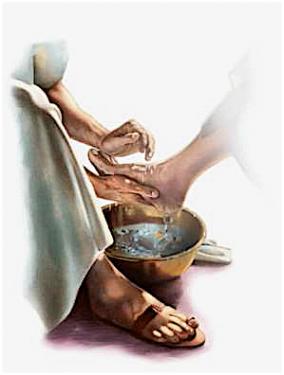
Do we have any chiropodists here – any ex-chiropodists.
A perfect profession for today’s theme.
There are some jobs that make you think twice whether you would want to take them on. People often talk about a dentist in that way, but what about a chiropodist? Traditionally a chiropodist is someone who may have treated both hands (chiro) and feet (pod) but now the term chiropodist and podiatrist are commonly used as podiatry specialists deal with the feet.
The original term, chiropodist, and its connection between hands and feet might better connect with this week’s story as Jesus’ hands are brought to bear on the dusty feet of his disciples. A task usually reserved for servants is taken up by the leader who is not afraid to get his hands dirty in the process of bringing cleansing to others.
As with so much of John’s gospel, such as the healing of the blind man and raising to life of Lazarus, this story again is operating at different levels. You have the physical action of cleansing, the water and towel, the hands rubbing away the dirt, but you also have the recognition that all this is symbolic of something greater, deeper, more resonant with God’s will and the confidence Jesus had in that will.
But it is truly again a remarkable story and sets up the final days of Jesus journey to the Cross.
John, differs from other Gospels in that he takes chapters upon chapters to detail what Jesus did, and said, on these last days; he also differs in the fact there is no ‘Last Supper’, this is the moment for John – only the second dinner detailed (the first being the one with Mary and Martha and the use of perfume to bathe Jesus feet) – this is the moment of Institution of announcement of preparation – of symbolic love.
Love is the verb used here. The pure and simply is an act of Love. At two levels – the symbolic one – pointing to the future and the physical one matching the command to Love.
Let me deal with the symbolic meaning first. We know water was used in the Old Testament for purification acts. The sense that water not just physically cleans but for those faithful to God this act of purification has meaning in making ones’ whole life clean before God. As Baptism followed on from this in John the Baptist’s and ministry and Jesus own Baptism, this symbolism is carried forward to be the sign of belonging given to a follower.
The symbolism of this act is significant. In washing feet Jesus is saying that purification – cleansing from sin is something that is pre-paid for us by God’s servant – by God’s Son. Of course, Peter can’t understand this. He argues with Jesus. In time he will know what Jesus was pointing to and saying.
We have the rest of the story to read back into this symbolic action. Pure and simple – this action points symbolically to the fact that in Jesus’ death – God’s sacrifice of His son – we have already been made clean, and in the grime of life in all the hazards we face as human beings which trip us up and make us stumble a distance from the ways of God, God continues to cleanse us from all that we think makes it impossible for us as weak humans from standing before His gaze. As someone once said, ‘God’s Love is the best answer for all they stinky things of the world’.
This is quite a simple conclusion for us to recognise today and rejoice in. So too is the second.
At a physical level, perhaps this story is even more straightforward.
Jesus’ act of foot washing is an action parable, which he makes clear in verse 15: “For I have set you an example, that you also should do as I have done to you.” The description is full of verbs ‘rising, laying down, taking up, wrapping round, and pouring before he begins to wash and dry the disciple’s feet’. That the King of kings bends low to dampen the soiled feet of fishermen, tax collectors and zealots in an act of service and humility is without question an act of Love an action of Love.
This is where everything is turned on its head. This is where Jesus actions merge with what he says later in the chapter – giving the world the new commandment, “Just as I have loved you, you also should love one another.”
Jesus’ example suggests that loving as he has loved means taking the role of a servant, caring for the needs of others without expecting anything in return. His example suggests that it is to do this not only for those who treat us well, but even for those who disappoint and hurt and betray us. Can Jesus really expect us to do this, to love and serve even those who fail us or stab us in the back? Are we not allowed even a few exceptions to the love commandment?
Jesus’ commandment to love one another is not a commandment to feel affection, but a commandment to act in a loving way, even when we would rather do otherwise. Of course, we always fall short of God’s perfect love, but that cannot be an excuse to nurse grudges and wallow in unloving behaviour. As we are washed by Jesus in God’s deep and generous love, our hearts are stretched to love more completely, fully, unwaveringly.
It is good this week, still near the beginning of Lent, to spend time with this story. No doubt part of John’s desire in including this moment at the start of the journey towards the cross is that it encourages us all to think about our own attitudes and lives. Are we cleansed and prepared, ready to journey with Jesus to the cross? Are we in a frame of mind that is ready to receive the radical edge that the gospel provides? Are we ready to have the dust and grime washed away from our thoughts and attitudes so that we are prepared to meet Jesus along the Way? Are we ready to take the basin and the towel and become servants of our neighbours in the world – ‘loving them in the way Jesus Loves us’?
